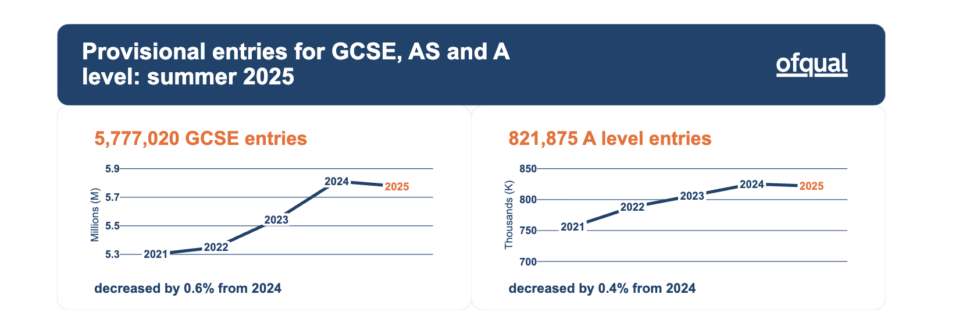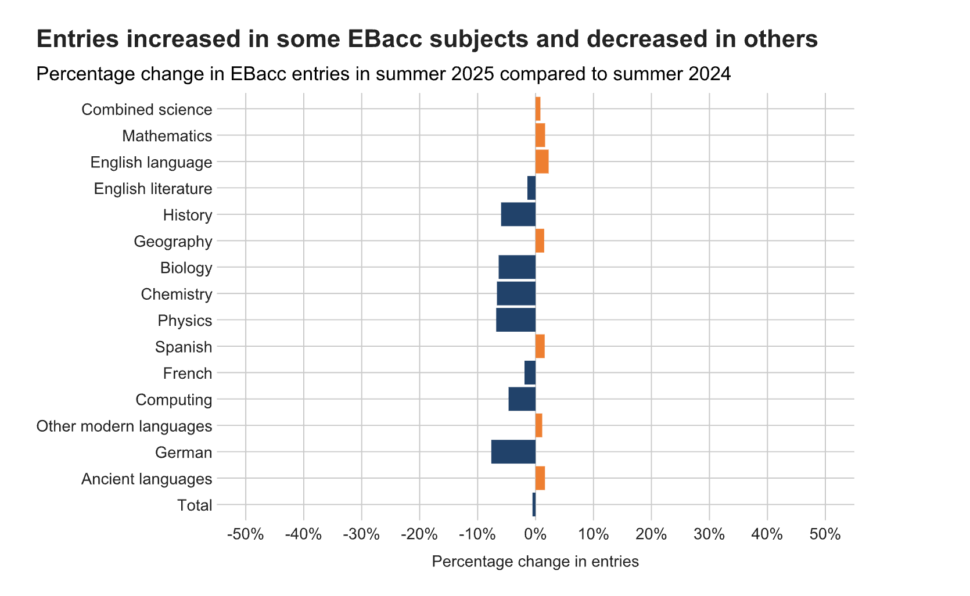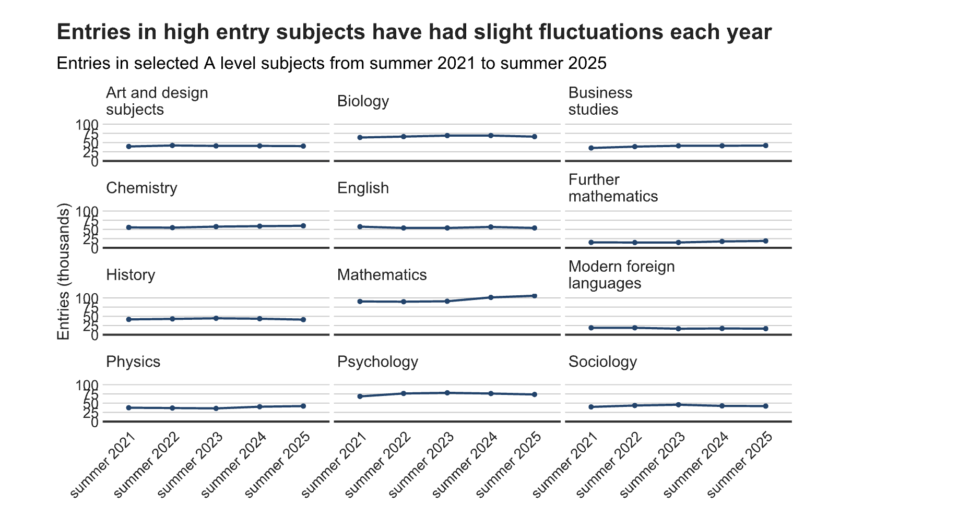GCSEs in German, the sciences and history have taken a popularity hit this year, sparking concerns that their plunging entries may be a consequence of the recruitment crisis.
The exams regulator has published provisional entry statistics for GCSEs and A-levels this summer.
It found a fall in pupils sitting GCSEs overall, after years of entries “steadily” increasing. But some EBacc subjects were particularly hard hit.
Meanwhile, Ofqual has blamed this year’s drop in A-level exam entries on the end of Covid marking.
A-level pupils sat their GCSEs in 2023, when grading standards returned to the pre-pandemic norm following soaring results during the pandemic.
Here’s what you need to know…
1. GCSE entries fall after ‘steady increase’
GCSE exam entries dipped 0.6 per cent this year, from 5.81 million in 2024 to 5.78 million. Ofqual said this “interrupts the trend of slowly but steadily increasing” numbers since 2021.
However, among year 11s only – who make up most of the entrants – the fall was higher, at 1.6 per cent.
Ofqual also pointed to ONS data showing a 0.2 per cent increase in the size of the 16-year-old population this year.
However Dave Thomson, chief statistician at FFT Datalab, believes the “small drop” in GCSE entries “can be explained by a dip” in year 11 numbers shown in Department for Education data.
Latest DfE data suggests 630,654 children are in this year’s cohort, compared to 634,835 in 2023-24.

2. Big falls in German, physics and chemistry …
The decrease in entries is driven by falls in both EBacc and non-Ebacc subjects.
The overall entry for all EBacc subjects decreased by 0.5 per cent, with eight of the 15 subjects falling.
The largest fall among these subjects was in German (down 7.6 per cent). It was followed by physics (6.8 per cent), chemistry (6.7 per cent), biology (6.4 per cent) and history (5.9 per cent).
Ofqual added: “Like with GCSE entries overall, this decrease in entries for some EBacc subjects interrupts previous trends of continuing increases over the past five years.”

The largest fall in subjects outside the EBacc was engineering (21 per cent).
Thomson added that the population dip “doesn’t fully explain the drop in entries in some subjects like the triple sciences and German”.
“Recruitment problems might be a factor here,” he added. “Not only do we see an increase in double science in place of a fall in triple we also see continued growth in Spanish and falls in French and German.”
Teacher hiring targets have been missed in 11 out of the last 12 years.
Sarah Hannafin, of leaders’ union NAHT, also thinks one reason for the falls could be that “with recruitment challenges really biting in schools, some simply don’t have the teachers they need to offer courses in certain subjects”.
She pointed to the likes of computing, chemistry, physics and modern foreign languages, which have missed recruitment targets and seen a fall in exam entries.
3. … but rise in English language
Statistics (9.2 per cent up) and performing arts (7.5 per cent up) were among those that registered increases.
Of the EBacc subjects, English language saw the largest rise in entries (2.3 per cent up).

4. Fall in A-levels after teacher grades
The number of entries at A-level fell by 0.4 per cent from 825,355 in 2024, to 821,875 this year.
This is despite the number of 18-year-olds in England rising by 3.8 per cent.
Ofqual stressed AS and A level entry figures “were likely informed by [the] return to normal grading patterns of GCSEs in summer 2023”.
Over the previous three years, data may have been “affected by the exceptional nature of GCSE awarding” during the pandemic and “a package of support available for students in summer 2022”, they said.

This is because it could have impacted youngsters’ “progression decisions” after year 11.
Pupils sitting A-levels this year would have taken their GCSEs in 2023, when grading standards had returned to pre-pandemic standards after their rise during Covid.
5. A-levels: Language lose out, while big maths rise
Entries for more than half of A-level subjects (17) reduced this year.
The largest falls were in French (8.3 per cent), German (6.8 per cent) and English language and literature (6.8 per cent).
Of the 13 that saw increases, maths had the largest (7.5 per cent), while business studies entries rose for the fourth year in a row.

















Your thoughts